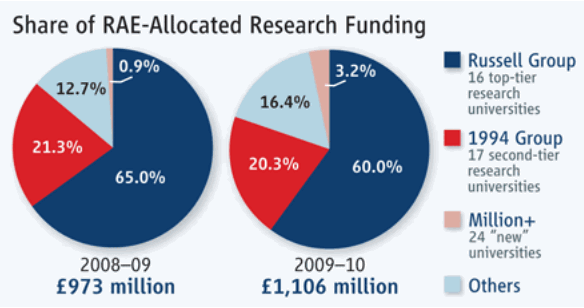|
|
|
|
|
|
|
News & Views item - March 2009 |
![]() Redistribution of England's 2009-10 University Block Funding -- Science
Reports. (March 13, 2009)
Redistribution of England's 2009-10 University Block Funding -- Science
Reports. (March 13, 2009)
Although the fact that the Higher Education Funding Council for England (Hefce) telegraphed that it was going to alter the proportion of block research funding for England's universities as compared to who got what based on the 2001 Research Assessment Exercise, and that the overall proportion for science would be protected ("ring fenced") that didn't preclude the research intensive universities decrying the result.
 New research quality data has led to shifts in research funding among English universities, with some earning such money for the first time. Source: Science/Times Higher Education (5March2009) |
The chart shows the proportional changes of old vs new, and from an Australian viewpoint it ought to be of interest that the Russell Group, which is comparable to Australia's Group of Eight has moved from 65% down to 60% of the £1.57 billion available.
As Science's Daniel Clery sums it up: "The higher the quality of a university's research, the more it gets. Who gets what is decided by a competition held at irregular intervals called the Research Assessment Exercise (RAE), a huge peer-review process involving more than 1000 researchers serving on 15 subject panels and 67 subpanels. Two-thirds of the annual money is allocated according to the RAE results."
Compared with the RAE of 2001 there was a significant change in the 2008 RAE's assessment procedure. Instead of giving a single quality score to whole departments, it noted what percentage of each department was doing work in each of the grades,4*, 3*, 2*, 1* and "Unclassified". What this amounts to is a system which has moved closer to the assessment of individual research projects, i.e. the evaluation by peers of research proposals put to the funding councils for competitive grants.
In fact those groups adjudged to be doing outstanding research, but not housed in a Russell Group or 1994 Group institution had a far better chance of getting block funding (read oncosts) support than previously. Understandably those "research intensive" universities who have had their support reduced are unhappy, but the problem is that the overall funding is too small, not that the little guys -- 25 universities are first-time awardees this year -- have got justly deserved support.
For all of UK Prime Minister Gordon Brown's fine rhetoric the fact is US President Barack Obama's US$25.5 billion stimulus for US science has blitzed the field.
And when all is said and done, RAE 2008 seems little more than a government's attempt to justify its implementation.